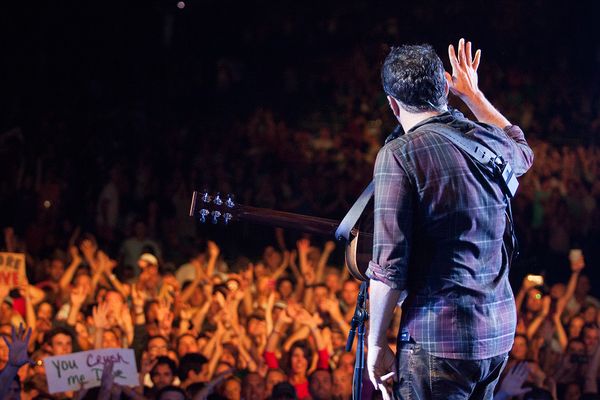Of all the genre and decade defining hip hop artists of the 1990s and early 2000s, I can safely say that the artist that had the greatest resonance with me is none other than Mos Def. While Mos may not have had as large of an impact on the hip hop scene as Nas, 2Pac and the Notorious B.I.G. at the time, his music carried a great deal of importance nonetheless. Mos employed the use of instrumental sounds and intelligently crafted lyrics to convey his thoughts and opinions of current events during the time period in which his music was created, and much of what he had to say in his songs still maintains significant relevance in the here and now. In order to reinforce this current day relevance of Mos’ music, I’d like to break down and analyze the lyrics of the first track on his solo debut album “Black on Both Sides”, which was released in October of 1999.
The first track off of “Black on Both Sides” is aptly titled “Fear Not of Man”, and the first time I heard it I wasn’t necessarily a big fan of it. It starts off slow with Mos speaking about the current state of hip hop and what direction the genre itself might be headed in as the 20th century comes to a close, and he doesn’t truly start rapping and displaying his lyrical talents until the song is halfway through. In all honesty, the track more or less sticks out like a sore thumb and doesn’t do the best job of engaging the listener if it’s their first time experiencing the album. However, after revisiting “Black on Both Sides” for many hours in recent weeks, I’ve come to experience a newfound appreciation for this first track and the many useful and interesting insights that it contains in it’s lyrics.
Rather than go line by line and reiterate everything Mos has conveyed to us via his lyrics, I’d like to highlight particular lines from “Fear Not of Man” that I found to be especially thought provoking. In the first collection of these lines, Mos writes, “Listen..people be askin me all the time, ‘Yo Mos, what’s gettin ready to happen with Hip-Hop?’ I tell em, ‘You know what’s gonna happen with Hip-Hop? Whatever’s happening with us.’” (http://genius.com/205981) At first I didn’t pick up on the implications of these lines, but as I listened closer and re-read the lyrics multiple times, I realized that the curators and consumers of hip-hop must have been genuinely worried about what would happen to the genre when the 90s and the 20th century came to a close. Change can often be a horrifying thing, especially when we are confronted with it up close and personal, and it’s quite likely that members of the hip-hop community believed that the 21st century would bring about a drastic change in hip-hop, and even the world itself. Fortunately, Mos provides us with a well reasoned answer, and he reiterates his statements by claiming, “We are Hip-Hop. Me, you, everybody, we are Hip-Hop, so Hip-Hop is going where we going.” (http://genius.com/205981) This simply means that the people are the heart and soul of hip-hop. Without the artists and the consumers and the producers, without the people of hip-hop, there would be no hip-hop. And whichever direction the people choose to go is the direction that hip-hop will follow. The true power of hip-hop comes from the people who give the genre life and meaning, not from the music that is a byproduct of the efforts and pursuits of those who invest their lives in the community (although the music is still of vital importance).
As the song continues, Mos relates to us his opinions of how people can better themselves by learning to find value not in their possessions or their jobs or the people around them, but in their own person. He writes, “Well, from my understanding people get better, When they start to understand that, they are valuable, And they not valuable because they got a whole lot of money, Or cause somebody, think they sexy, But they valuable because they been created by God.” (http://genius.com/205981) On the whole Mos is absolutely right when he states that people are incapable of becoming better versions of themselves until they learn to truly value who they actually are, and his statements are wildly relevant in present day. Many people my age struggle with a distinct lack of understanding of their own self-worth, and they often attempt to validate who they are and what they’re worth by comparing and contrasting themselves with their peers, and this is the wrong way to go about it. While Mos is correct in believing that people can realize their true value by turning to God, it is not the only way to bring this realization to fruition. We can find a sense of purpose by putting our energy into something that we’re truly passionate about, or by lending a hand to someone who’s truly in need. It’s even possible to discover your own self-value by setting small goals for yourself every day, and then continuously achieving those goals. Each and every one of us has more valuable qualities than we ever realize, we just have to dig deep and work relentlessly in order to bring them to the surface.
Finally, I’d like to dissect and analyze the second and third line of the Hook, which go as follows: “Fear not of men because men must die, Mind over matter and soul before flesh.” (http://genius.com/205981) With these two lines Mos not only links his lyrics to the title of his song, but he also solidifies his persona as a man of God. The first line, “Fear not of men because men must die,” is important not because it is a running theme in “Game of Thrones”, but because it shows that Mos recognizes that there are greater things for men to fear than their brothers and sisters, whether it be living a life full of regret, a lack of absolution at one’s time of death, or the potent loss of a loved one. Men are no more than flesh and bone, and while many in the world hold power beyond some of our wildest dreams and many others are inherently evil, who and what they are pales in comparison to God. It is most evident that Mos believes in this in the second line, for the mind and the soul are both greater than the body, and while the body itself my fail, the other two will almost always remain intact. Furthermore, when our inevitable deaths finally arrive, it is only our minds and our souls that have the possibility of moving on into an afterlife while our body remains behind in the world.
However, I think it’s possible to argue that these two lines from 1999 no longer hold the same relevance today as they did back then. The power that some men and women hold today appears to be that of a different caliber than they ever could have obtained over fifteen years ago, and while the mind and the soul may still be greater than the body, it’s certainly feasible to have a healthy fear of man. Maybe it is possible for the belief in a high power to curtail this fear that humans are capable of instilling in the hearts of of others, but the opposite is also a possibility.
All in all, it’s clear that there are countless lessons to be learned from the lyrics of Mos Def, and if it’s possible for us to glean so much knowledge from just one song, how much more do we stand to gain from truly understanding the entirety of his work?
I’ll leave the answer to that question up to you.





















